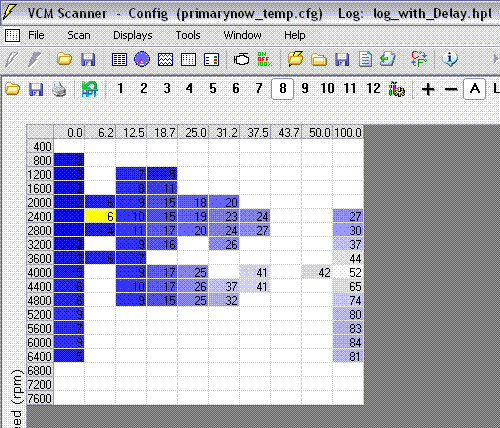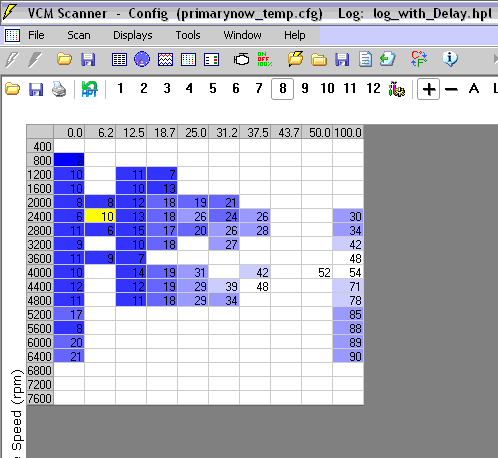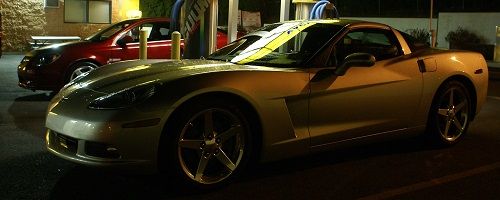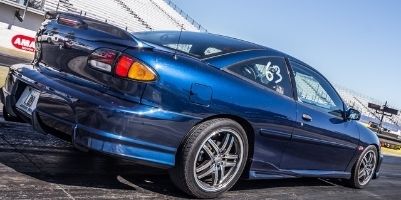MYTH: Stock J-body injectors are fine for bolt-ons and mild n/a performance
test vehicle: 2004 ecotec 5 speed coupe
mods: intake, otherwise STOCK.
ecu calib: stock
here is histogram data for the stock injectors on the car, with the stock rev limiter. The ecu flash is COMPLETELY stock.
average values:

peak values:

RESULTS:
intake air temperature at the time of test was between 20*F to 23*F
stock injector size is 25# or 252cc
highest average duty cycle for stock injectors = 81% @ 6400rpm
highest peak duty cycle for stock injectors = 90% @ 6400rpm
maximum recommended injector duty cycle is 80%-85%
please keep in mind, this is on a stock ecu calibration, and that actual AFR is going to be in the neighborhood of 14.2-14.4:1 at wide open throttle in PE. I will be hooking up a wideband in the near future to confirm this..
but
90% IDC for ~14.2:1? thats ridiculous.
MYTH BUSTED. Stock injectors are already 80%+ on a completely stock engine.
I will be following this one up during warmer weather to see how much IDC will change with temperature.

Before you go too far...
You are only evaluating one point, and you are assuming that the maximum HP output is at the end of the RPM band. Most bolt on's and average mods will change the mid-range values, but not the values at the very top of the RPM range. It makes sense that the duty cycle is very high at high RPM since duty cycle is the ratio of on time to off time. Fire the injectors faster and you get a higher duty cycle.
The thing that you are missing is that most bolt on's don't increase HP outside of the max HP/TQ band, which I think is about 5500 RPM on the ECO. Your graph shows plenty of space in the midrange RPM for an intake/header and basic mods, especially if those mods shift the peak HP/TQ band to the left.
 4cyltuner.com
4cyltuner.com - Information Source For 4 Cylinder Tuners
Buy stuff from CarCustoms Ebay! Won't be disappointed!
shifted makes a good point, but mods like the LE5 manifold and aftermarket cams will increase HP at or above the stock redline. bolt-ons your ok, after that get bigger injectors. I need to get a shot of my scans, but i was over 90% at redline on a stock calibration.
PJ, I bet it's running richer than 14:1 in PE - mine was running 12.5:1 on the wideband (12.8:1 commanded as per the scanner) at redline with the stock calibration.

I agree with many parts of what has been said. It has always been said out cars run rich stock and I agree. My car was running 11:5's. That was on a stock tune.
I also feel that there is a point when the injectors are too small for bolt on N/A performance. I did hit that point. I'm just not sure if I would say that point is when you add a intake. I think some more testing is needed.
 FU Tuning
FU Tuning
I was always told that Injector open time was more important then its duty cycle.......
something like, its bad for them to be open longer then 17-19 ms.......
Chris
'02 Z-24 Supercharged
13.7 @102.45 MPH Third Place, 2007 GMSC Bash SOLD AS OF 01MAR08
Taetsch Z-24 wrote:I was always told that Injector open time was more important then its duty cycle.......
something like, its bad for them to be open longer then 17-19 ms.......
Chris
duty cycle is calcualted directly from the puslewidth (ms) and RPM. if i understand it correctly, there is less time for the injectors to fire the higher the RPM because, well, each stroke is happening faster, so it kind of normalizes the measurement

Duty cycle is a crappy way to tell if a injector is over working.
Chris
'02 Z-24 Supercharged
13.7 @102.45 MPH Third Place, 2007 GMSC Bash SOLD AS OF 01MAR08
Duty cycle is the percentage of time an injector is on versus the amount of time it is off. In other words, if Duty cycle is to remain the same when the amount of time it is left on is increased, the amount of time left off should also increase in proportion to the duty cycle. Like a welder, I can weld for 1 minute or 10 minutes straight on a welder. But its only 10% duty cycle, So if I weld for one minute I need to let it sit for 10. If I weld for 10 minutes, it needs to sit for 100 minutes before i can weld again to maintain the duty cycle. Of course its not practical to have to wait that long which is usually why you weld in shorter spurts under a minute long.
So, For simplicity sake an injector is turned on for one second. Meaning one second from the instant current begins to build a magnetic field in the coil till the instant that current stops flowing. If 10 seconds pass before it is opened again and this cycle is repeated it is being duty cycled at 10% because 1 = 10% of 10.
So if an injector is firing for 35 m/s at 2500rpm...In an SFI Single Fire Mode it will fire ~10.416 times a second.
I come up with ~36.45% DC. Check my math.

Buildin' n' Boostin for 08' - Alex Richards
I understand how IDC is calculated, I don't understand why it isn't a good way to indicate an injector is "overworked"
if by "overworked" you mean clipping.. then no, IDC isn't a good indication of that.
but if the injector can't get fuel into the air charge in the allotted time it has...
idk, kinda sounds like the injector is too small to me


Injector duty cycle is NOT calculated in the way some of you are thinking. It's how long the injector is open COMPARED TO the entire time it takes to make that specific revolution. Just because there's a higher RPM doesn't mean the IDC is innacurrately measuring how long it's open.
2001 Olds Alero (LD9)
650 whp / 543 ft-lb
@turboalero
^
^
@!#$ hell, I did not intend to post that at all, and since I'm not Premium, I can't edit it. I started to type that before reading everything. I hit back on my browser by accident and somehow fubared it. I was attempting to rewrite that entire thing to say:
Very interesting discussion. So injector duty cycle increases as the RPMs go up, since revolutions are happening quicker and the injector is staying open longer per revolution to handle that. But still, since the injectors are staying open longer and repeatedly at this high RPM, that is why duty cycle seems to be a good way to measure how overworked they get. (Longer they're open and especially over and over like that increases heat).
2001 Olds Alero (LD9)
650 whp / 543 ft-lb
@turboalero
[ion wrote: C2]Injector duty cycle is NOT calculated in the way some of you are thinking. It's how long the injector is open COMPARED TO the entire time it takes to make that specific revolution. Just because there's a higher RPM doesn't mean the IDC is innacurrately measuring how long it's open.
ITs on vs. off, Thats an industry standard when defining duty cycle. On time vs how long it takes to complete a combustion cycle would tell us nothing other then how big or small an injector should be. Plus the valve is only open 1/4th of that time or less. So if your theory were true all injectors would only be capable of having a max duty cycle of 40-50%. Beyond that its spraying fuel at the back of a closed valve on the exhaust stroke.
Duty cycle does go up with RPM typically but not because it takes less time to complete a combustion cycle. You must think of it in terms of every combustion cycle happens in a set amount of time, the only thing that varies is how much fuel is sprayed (How long the injector is on relative to fuel pressure) The reason IDC goes up when RPM goes up is because there is more airflow, thus the PCM holds the injectors open longer to maintain a proper A/F charge. The actual firing PROCESS goes faster, but how long the injectors are open remains relative to how much fuel is required. This is why we must raise fuel pressure when RPM goes up because if we dont, the injector cannot deliver enough fuel in an efficient amount of time before the valve closes. Duty Cycle changes because the time the injector is left on is increased therefore decreasing the time it can be left off.
Say at X airflow I need Y amount of fuel.
so for a 14.7:1 A/F I need ~6.8cf of fuel for every 100cf of air.
This stays CONSTANT. IT will always be the same since PCM's these days are concerned with burning the fuel in the most effcient manner. for now its the chemically correct 14.7:1.
So no matter how fast the engine goes if it flows 100cfm at 2000rpm then it just needs to deliver 6.8cf of fuel. It just needs to do it 20 times over every minute. (BEcause 100cfm/2000rpm = 20)
And heat is what we're all fighting here. Clipping is due to high fuel pressure which causes the pintle to be pressed against the seat to the point where the coil cannot overcome the force needed to unseat it.

Buildin' n' Boostin for 08' - Alex Richards
Alex Richards wrote:Duty cycle is the percentage of time an injector is on versus the amount of time it is off. In other words, if Duty cycle is to remain the same when the amount of time it is left on is increased, the amount of time left off should also increase in proportion to the duty cycle. Like a welder, I can weld for 1 minute or 10 minutes straight on a welder. But its only 10% duty cycle, So if I weld for one minute I need to let it sit for 10. If I weld for 10 minutes, it needs to sit for 100 minutes before i can weld again to maintain the duty cycle. Of course its not practical to have to wait that long which is usually why you weld in shorter spurts under a minute long.
So, For simplicity sake an injector is turned on for one second. Meaning one second from the instant current begins to build a magnetic field in the coil till the instant that current stops flowing. If 10 seconds pass before it is opened again and this cycle is repeated it is being duty cycled at 10% because 1 = 10% of 10.
So if an injector is firing for 35 m/s at 2500rpm...In an SFI Single Fire Mode it will fire ~10.416 times a second.
I come up with ~36.45% DC. Check my math.
You would let it set for 9 minutes at a 10% duty cycle.
Duty cycle is not defined as the "on" time divided by the "off" time. Its the "on" time divided by the entire period of a cycle, which includes both the "on" and "off" time. If you assume a square wave pulse train and the injectors spray for 1 ms and are off for 10 ms, it would be 1/(1+10) = 1/11 = 9.1% duty cycle.....not 10%.
For the general meaning of duty cycle in terms of electronics....
http://en.wikipedia.org/wiki/Duty_cycle
As it applies to injector puslewidth...
http://www.stealth316.com/2-calc-idc.htm
I have no signiture
Whalesac wrote:Alex Richards wrote:Duty cycle is the percentage of time an injector is on versus the amount of time it is off. In other words, if Duty cycle is to remain the same when the amount of time it is left on is increased, the amount of time left off should also increase in proportion to the duty cycle. Like a welder, I can weld for 1 minute or 10 minutes straight on a welder. But its only 10% duty cycle, So if I weld for one minute I need to let it sit for 10. If I weld for 10 minutes, it needs to sit for 100 minutes before i can weld again to maintain the duty cycle. Of course its not practical to have to wait that long which is usually why you weld in shorter spurts under a minute long.
So, For simplicity sake an injector is turned on for one second. Meaning one second from the instant current begins to build a magnetic field in the coil till the instant that current stops flowing. If 10 seconds pass before it is opened again and this cycle is repeated it is being duty cycled at 10% because 1 = 10% of 10.
So if an injector is firing for 35 m/s at 2500rpm...In an SFI Single Fire Mode it will fire ~10.416 times a second.
I come up with ~36.45% DC. Check my math.
You would let it set for 9 minutes at a 10% duty cycle.
Duty cycle is not defined as the "on" time divided by the "off" time. Its the "on" time divided by the entire period of a cycle, which includes both the "on" and "off" time. If you assume a square wave pulse train and the injectors spray for 1 ms and are off for 10 ms, it would be 1/(1+10) = 1/11 = 9.1% duty cycle.....not 10%.
For the general meaning of duty cycle in terms of electronics....http://en.wikipedia.org/wiki/Duty_cycle
As it applies to injector puslewidth...http://www.stealth316.com/2-calc-idc.htm
Sorry it was late...I had my numbers a little goofed...
:-(

Buildin' n' Boostin for 08' - Alex Richards
DaFlyinSkwir(LS61) /PJ/ OEM+ wrote:Taetsch Z-24 wrote:Duty cycle is a crappy way to tell if a injector is over working.
Chris
elaborate please.
Milla-Seconds is more Impotent to see if a Injector is overworking.
Chris
'02 Z-24 Supercharged
13.7 @102.45 MPH Third Place, 2007 GMSC Bash SOLD AS OF 01MAR08
^^^^ Cranking pulsewidths can be as high and often higher than 20 milliseconds on cold starts, which happens to be 100% duty cycle at 6000 RPM. Your highest injector pulswidth should occur around max torque, because if you analyze what an engine is doing in just one cycle, you see that it produces a force on the piston based on the amount of air and fuel that has entered the cylinder. The point of max torque occurs when this force is greatest which happens around max VE which occurs at a specific rpm. As rpm increases and VE decreases, torque also decreases and a shorter pulsewidth is needed. However, duty cycle still increases because the time between injection pulses decreases and VE doesn't drop at a fast enough rate. At higher rpms, a duty cycle of more than 90% may cause the injectors to never completely close which is a very good indication that you are overworking your injectors. That is a reason why rule of thumb is to keep the duty cycle around 80-85% MAX.
I have no signiture
Good thing that most cars open only one injector at start up\below 2600 RPM at a time... and above open 2 or even 4 at a time...
I am just retelling what I was told by the person who works for the company that made the Gm supercharger.....
Chris
'02 Z-24 Supercharged
13.7 @102.45 MPH Third Place, 2007 GMSC Bash SOLD AS OF 01MAR08
^^^ I'm not saying you are wrong....just that max injector pulsewidth should be qualified (as should duty cycle) for a given RPM. When you do that, we are saying the same thing because duty cycle is merely a measurement of injector pulsewidth and RPM.
I have no signiture
Whalesac wrote:^^^ I'm not saying you are wrong....just that max injector pulsewidth should be qualified (as should duty cycle) for a given RPM. When you do that, we are saying the same thing because duty cycle is merely a measurement of injector pulsewidth and RPM.
exactly - IDC is just pulsewidth normalized to RPM. It's an easier makes interpreting the puslewidth as "good" "bad" or "OK" easier. Of course if you're not calculating it correctly, there's a problem. the default PID in HPT for IDC is the correct formula...

Quote:
Good thing that most cars open only one injector at start up\below 2600 RPM at a time... and above open 2 or even 4 at a time...
Hmmm.... what about all the cars using batch fire injection? Batch injection should change D/C measurement as each time piston crosses TDC another injection event is created. Regardless, at 7k rpm any commanded injector time longer than 8.6ms means the injectors are static, completely dependent on fuel volume and pressure to provide increasing amounts of fuel. Bad situation. Maybe the term "overworked" indicates keeping injector on constantly with no fuel cooling? Not really sure how the term applies. Maybe the 19ms should be counted from the time the injector first goes static? That would be interesting as it only refers to injector damage, not possible damage to engine from incorrect fueling.
Alex Richards, like previously mentioned you need to have total time of period defined for D/C. Without it, you might try to run welder for 2 hrs straight out of 24 and still claim you're in the 10% D/C window of the welder. Just keep the fire extinguisher handy, as that cheapie transformer is gonna crap out on ya long before the 2 hrs is up.
PJ, IAT of 20 deg F creates LARGE change in needed fuel. Air density is 30% greater than at 180 deg F, typical underhood temp in summertime in northeast. 30% lower IPW would put D/C under 80% max suggested value. Lucky for you, the next few days of testing could simulate arctic conditions.
-->Slow
Whats wrong with having a static injector? its only in opening or closing that its working\building heat, after all, it is just a over priced solenoid.
If I'm not mistaken, almost all cars run them static at WOT\top of the RPM conditions.
Hell, Look at old 4.3 Vin W Gm motors, One injector spraying in to 6 Pop-Its....
its always on.
Chris
'02 Z-24 Supercharged
13.7 @102.45 MPH Third Place, 2007 GMSC Bash SOLD AS OF 01MAR08
Quote:
PJ, IAT of 20 deg F creates LARGE change in needed fuel. Air density is 30% greater than at 180 deg F, typical underhood temp in summertime in northeast. 30% lower IPW would put D/C under 80% max suggested value. Lucky for you, the next few days of testing could simulate arctic conditions.
lol. I was planning on revisiting this when weather warmed up, I want an IAT of at least 65 degrees for my next test, and another around 90 degrees just to see how much the IDC will change.
Whalesac wrote:
^^^^ Cranking pulsewidths can be as high and often higher than 20 milliseconds on cold starts, which happens to be 100% duty cycle at 6000 RPM. Your highest injector pulswidth should occur around max torque, because if you analyze what an engine is doing in just one cycle, you see that it produces a force on the piston based on the amount of air and fuel that has entered the cylinder. The point of max torque occurs when this force is greatest which happens around max VE which occurs at a specific rpm. As rpm increases and VE decreases, torque also decreases and a shorter pulsewidth is needed. However, duty cycle still increases because the time between injection pulses decreases and VE doesn't drop at a fast enough rate. At higher rpms, a duty cycle of more than 90% may cause the injectors to never completely close which is a very good indication that you are overworking your injectors. That is a reason why rule of thumb is to keep the duty cycle around 80-85% MAX.
this is exactly what I thought, and is why I still think that IDC is the most qualified way to verify if your injectors are sized properly.
perhaps I'll make a histogram that plots IDC vs pulse width vs RPM to see the correlation. As mentioned, peak pulsewidth should occur at ~4300rpm (note on both maps in the original post, IDC jumps the most from the 4000 to 4400 cells), which coincides with peak volumetric efficiency on stock ecotec dynographs.. but it still would be interesting to see.
in regards to the PW vs IDC discussion.. IMO, if an injector in higher rpm cannot get the required amount of fuel into the chamber in the amount of time it has available... it is too small.

Quote:
Whats wrong with having a static injector?
This is an old argument. When the injector is static you have no room for the ecm to account for any changes in air density or voltage. If the static injector delivers the right amount of fuel at 180 deg F, then it's 30% lean at 20 deg F If the static injector delivers enough fuel when system voltage is at 14V, then it's lean if system voltage drops to 12V. Plenty of people have run static injectors and been ok, but it's completely missing the point of having a control box that can compensate for changes.
Quote:
Because its only in opening or closing that its working\building heat, after all, it is just a over priced solenoid.
Any time electrical current passes through the injector, heat is created. Peak and hold (low Ohm) injectors see more current during the initial opening cycle than saturated types, but all will heat when held on for a length of time. This is why I was asking what was meant by "overworked" and where the 19ms number comes into play.
Quote:
If I'm not mistaken, almost all cars run them static at WOT\top of the RPM conditions.
Well, actually, most factory cars are near the 80% duty cycle rule.
Quote:
Hell, Look at old 4.3 Vin W Gm motors, One injector spraying in to 6 Pop-Its....[/qoute]
Yep, but the nozzles were sized at 19#/hr so the injector had time to turn on and off. It didn't go static.
-->Slow
Hm.
Looks like the Brown Tops at to small for my W41 then
Good to see you back around Slow
Chris
'02 Z-24 Supercharged
13.7 @102.45 MPH Third Place, 2007 GMSC Bash SOLD AS OF 01MAR08













